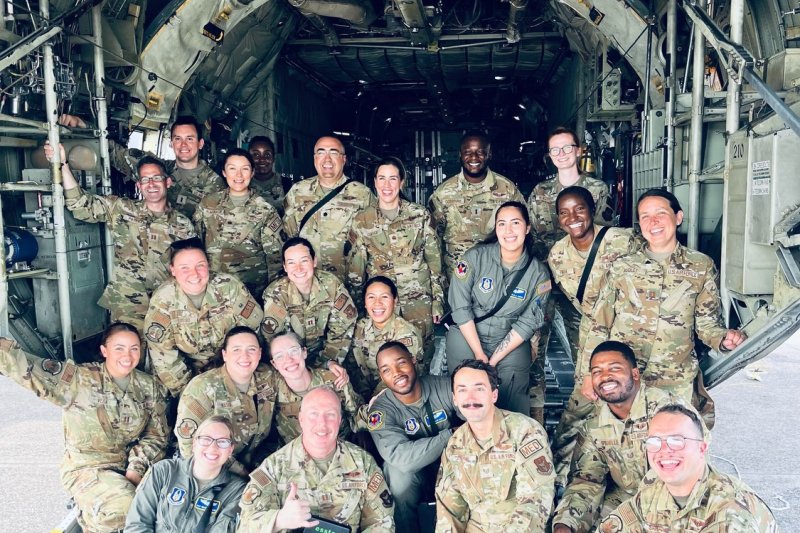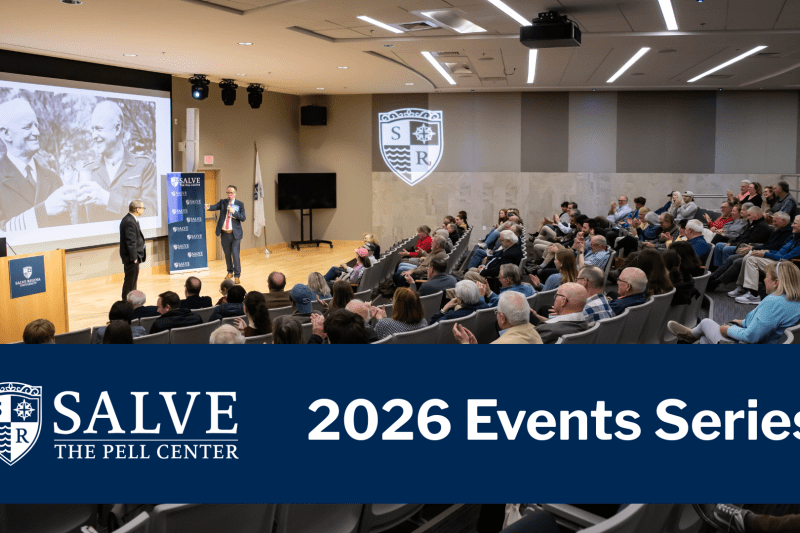
Is eternal time travel possible? Could Antarctica hold an untold human chapter?
Salve faculty reveal big ideas in McKillop Library lecture series.
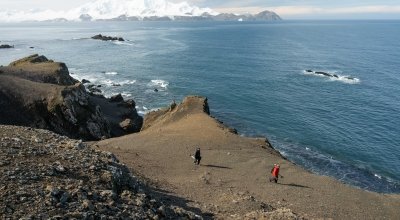
What do time travel and archaeology beyond the end of the world have in common? They’re both part of this fall’s McKillop Library faculty lecture series – a showcase of the bold, boundary-pushing research happening at Salve Regina University.
More than a place to study, McKillop Library stands as a living laboratory of ideas, where faculty share their latest discoveries and invite us to reshape what we think we know. This fall’s lineup is a testament to the depth, curiosity and innovation of Salve’s faculty – scholars who challenge convention and bring complex topics to life in ways that inspire, surprise and connect us all.
Is time travel possible?
The lecture series began in September with associate professor of philosophy Dr. Troy Catterson, who directs Salve’s Ph.D. program in humanities and technology. His talk, “The Trinity and Time Travel,” turned a classic puzzle on its head by demonstrating how science can support the idea of a perfect, all-knowing being.
Drawing on his sabbatical research in logic, metaphysics and epistemology, he modeled the Trinity by placing God outside of time, in time and then entering eternity. That journey, he argued, would generate three distinct centers of consciousness within one divine entity – capable of interacting with each other without collapsing into contradiction.
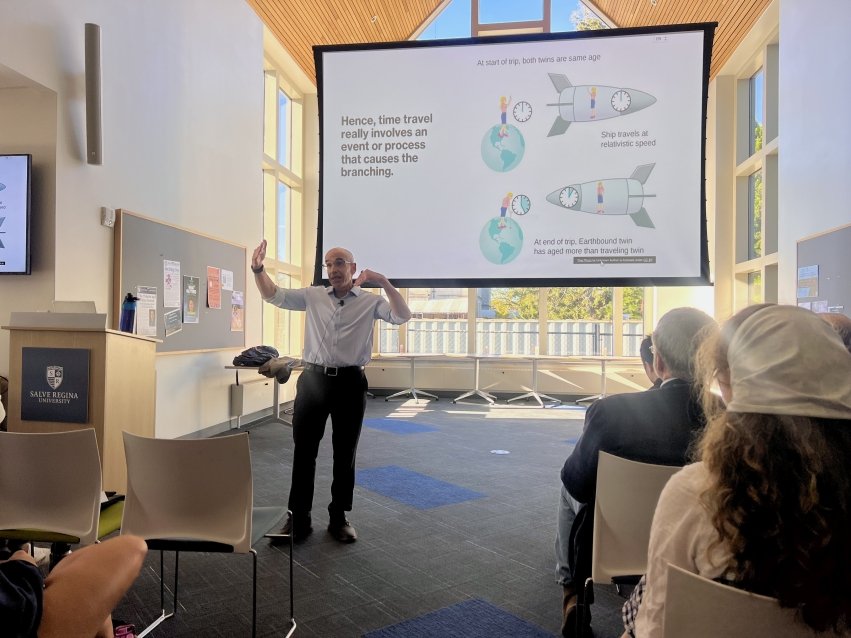
As Catterson puts it, he isn’t trying to prove doctrine so much as to test coherence. “I’m not concerned as to whether it’s true. I’m concerned whether you have to leave your brain at the door to believe it,” he explained.
To make the idea workable, Catterson adapted insights from physics and time-travel thought experiments while sidestepping paradoxes of going into the past. His “eternal time travel” framework separated timelines without changing events, preserving both omniscience and genuine temporal experience. He closed by pointing to next steps beyond theology: how a coherent unity-in-diversity could inform ethics central to the Mercy mission, offering a fresh way to ground human dignity and equality.
Curious to learn more? Watch the full lecture here.
Research at the edge of the world
Dive into one of Antarctica’s biggest archaeological question marks with Dr. Nathaniel Kitchel, assistant professor in the Noreen Stonor Drexel Cultural and Historic Preservation Program, as he pulls back the veil on a continent that, as he noted, is “almost universally portrayed as a land unaltered and unspoiled by human activities.”
“The notion of the pre-European arrival of humans there is, at best, the realm of jokes, and at worst, conspiracy theories,” said Kitchel. “There has been little archaeological research undertaken in Antarctica, leaving assumptions about when the continent was first settled, by whom and for what purpose, unexamined.”
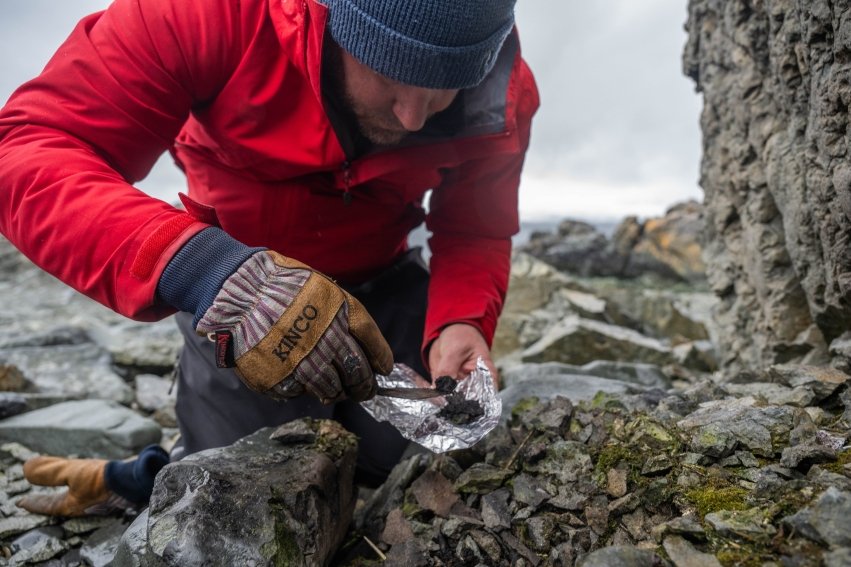
In his lecture, “Archaeology Beyond the End of the World” on Thursday, Oct. 16, Kitchel will recount his winter 2025 expedition to the South Shetland Islands with a team led by Dartmouth’s Dr. Jesse Casana. He’ll guide attendees across the Drake Passage, into uncharted coves by dinghy and onto stark shores where he conducted survey work in what he called a “voyage beyond the end of the world.” Along the way, he'll share the team’s early findings, reflect on how Ice Age communities elsewhere adapted to rapid climate change and spotlight the “stunning, stark, yet delicate beauty of the South Shetland Islands.”
It’s a rare chance to learn, in real time, how an archaeologist grounded in New England Ice Age research tests big ideas at the edge of the map.
“These faculty lectures give students an opportunity to learn about their professors’ personal research and they are a wonderful chance for students to join scholarly conversations as they happen in real time,” said Dawn Emsellem-Wichowski, director of library services. “I look forward to each faculty lecture, in part because of the diversity of research happening across the disciplines, and because it’s thrilling to see the paths our faculty follow in their pursuit of scholarly inquiry.”
Featured image of Dr. Jesse Casana (front) and Kitchel carrying survey equipment on Livingston Island by Jeff Kerby.


